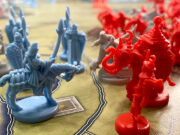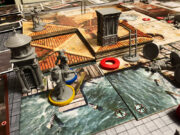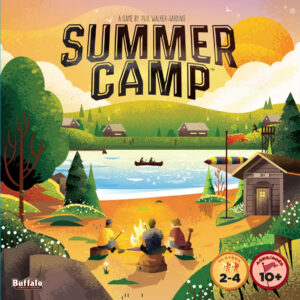 It’s hard to believe that, at the time of this writing, it’s already August. It feels like the summer just started and yet things are winding down. Kids start going back to school and we prepare ourselves for colder temperatures and warm blankets. Growing up, I always felt like summers came and went too fast. Staying up late and watching the stars were interrupted by early mornings and alarm clocks for school.
It’s hard to believe that, at the time of this writing, it’s already August. It feels like the summer just started and yet things are winding down. Kids start going back to school and we prepare ourselves for colder temperatures and warm blankets. Growing up, I always felt like summers came and went too fast. Staying up late and watching the stars were interrupted by early mornings and alarm clocks for school.
But if you were one of the lucky ones, you had the opportunity to do something fun during those summer vacation months. For me, a couple of summers were enjoyed at summer camp, both as a camper and later, as a counselor. I have many fond memories of camp, so of course, when Summer Camp came out, I wanted to try it. Summer Camp was designed by Phil Walker-Harding and published by Buffalo Games and Puzzles. It plays two to four in 45-60 mins.
Gameplay Overview:
Summer Camp is a deck building game with a camp theme. Players will be racing to cross bridges for badges, buying up cards for points and abilities, all in the hopes to be the top camper with the most points at the end of the game. If you’re familiar with deck building games, a lot will seem very familiar. There are a few cards that are always available for purchase, as well as an array of ones that may or may not be when it comes back around to you.
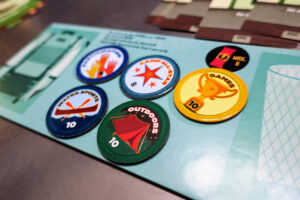
On your turn, you’ll play out your entire hand of cards, either for their actions or for energy to buy more cards. Those are available once they’re shuffled back into your deck. You’ll be moving your campers along three different paths, each with an associated Activity. The game comes with seven different Activities, all with a slightly different play style. Any movement cards you play will allow you to move along that Activity’s path. But you won’t be just moving and buying cards, because at various spots along the path, you’ll be able to pick up some perks that might start to feel a little like engine building. These perks include drawing a card, getting a Snack Bar token (used for buying cards), or moving one of your campers along any path. These just might let you have a little longer turn or help you get that merit badge.
Merit badges are another way you’ll be getting points, and the game scales what’s available based on your player count. Getting these will be crucial for jumping ahead in the race for points. The badges require getting your campers on or across bridges. If you happen to be the first person who gets all three of their Activity badges by reaching the end of your paths, then the end game is triggered. Play will continue until it gets back to the starting player. Total up your points and see who’s the most awesome camper.
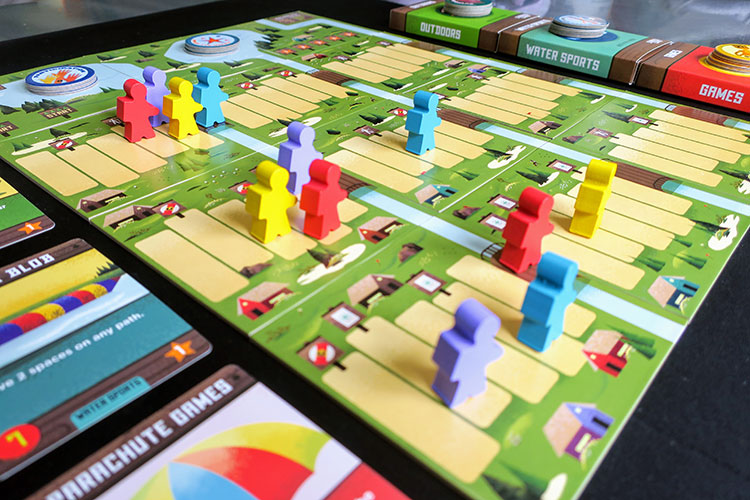
Game Experience:
Summer Camp is a great game to introduce new players to the concept of deck building. That’s probably why it’s being sold at Target. It does a good job of being accessible without being overly complicated. What a player does on their turn is fairly straightforward and they should feel comfortable without the training wheels after a few rounds. This can be a good or bad thing, depending on what your level of experience is with these types of games. Players who have gone on to play Clank or The Lost Ruins of Arnak may not keep Summer Camp. That isn’t to say they won’t enjoy it; they are not the target audience though.
One thing I really appreciated about Summer Camp is the amount of versatility built in which I think will lead to families playing this more than a few times. Supposing you wanted to experience what each Activity brought to the game, you’d have to play at least three full games to get that exposure. The rulebook shows you what is in each deck, so that might help you cater your game a little more to your group. On top of these Activities, during setup, you’re randomly laying out the path cards, all of which change up where their perks. While I don’t think path cards will necessarily have the impact on a game experience that a variety of decks will, it’s still a change that can help keep a game fresh and less predictable.
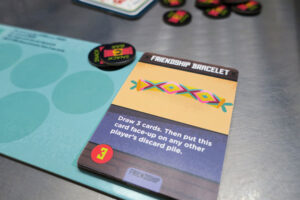
Something else that was appreciated about the design of Summer Camp is how it scales in player count. Depending on that number, you’ll change up how many merit badges are available and the point spread. I played this at two players and four. While both were enjoyable and made me feel like I needed to race to the finish line, it was a little more exciting with four, just because racing against more people is fun.
One critique though. While churning through available Activity cards will naturally happen in three and four-player games, unless someone is ambitiously buying up those cards in a two-player game, there could be some stagnation or just too many cards that can’t be bought. It would be nice if there had been a way to overcome this. But I don’t know if that would’ve added complexity that the designer was trying to steer away from for this target audience.
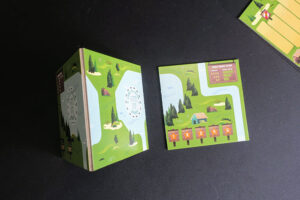
While I do think families that take a shine to Summer Camp are going to play it a good amount of times, I think it’s fair to know that the quality of the cards is not great. Even after my second game, my cards were already starting to show that bend that warped their fresh look, which was just from shuffling. I wish this wasn’t the case, especially since all you do in this game hinges mostly on your handling these. Also, if you, like me, want your boards to lay flat, you may have to flex them to do so. While I was setting up to take pictures, I flexed the lake board and one snapped. I was shocked. They probably could have just included all three pieces of the lake board as single pieces, just as the path.
While Summer Camp is going to be a game I recommend to new players who want to see what deck building is all about, I wish the rulebook had its information laid out better. Keeping in mind that this could be someone’s first foray into a game that’s more complex than roll and move, I would have liked to see things organized better. It’s not a complete mess and definitely not the worst rulebook I’ve come across, but I think it can be disruptive to the learning process when you’re getting pieces of a rule concept either a page or two later or in a separate box off to the side.
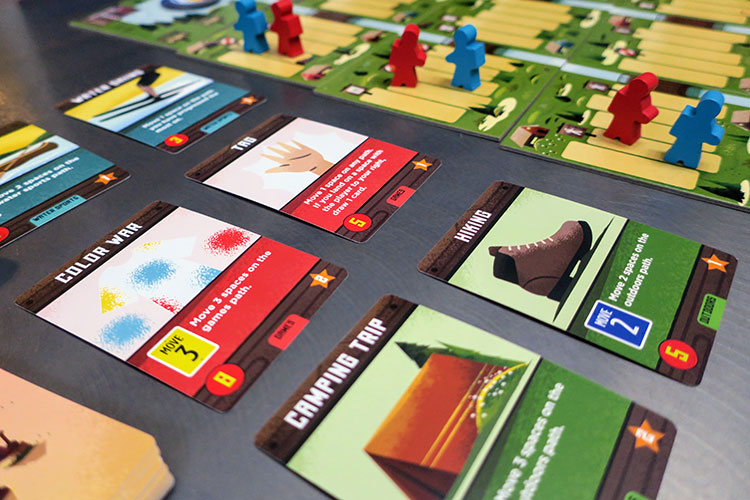
Final Thoughts:
Summer Camp is a fun and enjoyable introduction to deck building. I think a lot of newcomers to board gaming will enjoy it and I imagine it’ll be gifted to many of them as the holidays roll around. I could have nit picked about some of its other shortcomings, but ultimately, this is a good game. While it may not stay in your collection if you’ve moved on to more complex games, it’s still worth checking out.
Final Score: 4 Stars – a fun intro to deck building that’ll make you long for summer
 Hits:
Hits:
• Great theme, especially if you had camp experience
• Solid game to introduce deck building
• The Activity decks and randomized path cards provide plenty of variety
• Scales fairly well
Misses:
• The cards are going to bend
• Card markets could get stagnant, especially in a two-player game
• Gamers who play more complex deck-building games might not keep this
• Rulebook could have been laid out information better




